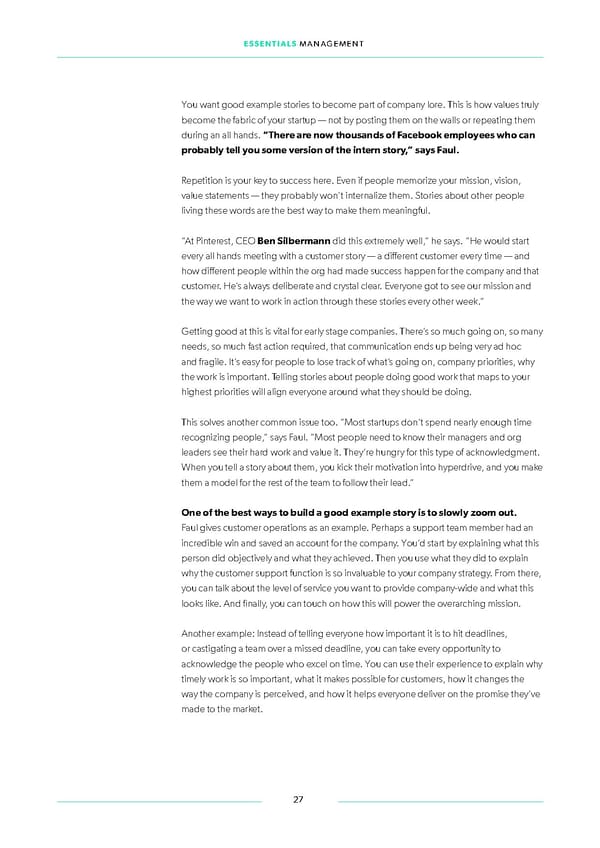ESSENTIALS MANAGEMENT You want good example stories to become part of company lore. This is how values truly become the fabric of your startup — not by posting them on the walls or repeating them during an all hands. “There are now thousands of Facebook employees who can probably tell you some version of the intern story,” says Faul. Repetition is your key to success here. Even if people memorize your mission, vision, value statements — they probably won’t internalize them. Stories about other people living these words are the best way to make them meaningful. “At Pinterest, CEO Ben Silbermann did this extremely well,” he says. “He would start every all hands meeting with a customer story — a different customer every time — and how different people within the org had made success happen for the company and that customer. He’s always deliberate and crystal clear. Everyone got to see our mission and the way we want to work in action through these stories every other week.” Getting good at this is vital for early stage companies. There’s so much going on, so many needs, so much fast action required, that communication ends up being very ad hoc and fragile. It’s easy for people to lose track of what’s going on, company priorities, why the work is important. Telling stories about people doing good work that maps to your highest priorities will align everyone around what they should be doing. This solves another common issue too. “Most startups don’t spend nearly enough time recognizing people,” says Faul. “Most people need to know their managers and org leaders see their hard work and value it. They’re hungry for this type of acknowledgment. When you tell a story about them, you kick their motivation into hyperdrive, and you make them a model for the rest of the team to follow their lead.” One of the best ways to build a good example story is to slowly zoom out. Faul gives customer operations as an example. Perhaps a support team member had an incredible win and saved an account for the company. You’d start by explaining what this person did objectively and what they achieved. Then you use what they did to explain why the customer support function is so invaluable to your company strategy. From there, you can talk about the level of service you want to provide company-wide and what this looks like. And ifnally, you can touch on how this will power the overarching mission. Another example: Instead of telling everyone how important it is to hit deadlines, or castigating a team over a missed deadline, you can take every opportunity to acknowledge the people who excel on time. You can use their experience to explain why timely work is so important, what it makes possible for customers, how it changes the way the company is perceived, and how it helps everyone deliver on the promise they’ve made to the market. 27
 Essentials Management First Round Capital Page 26 Page 28
Essentials Management First Round Capital Page 26 Page 28